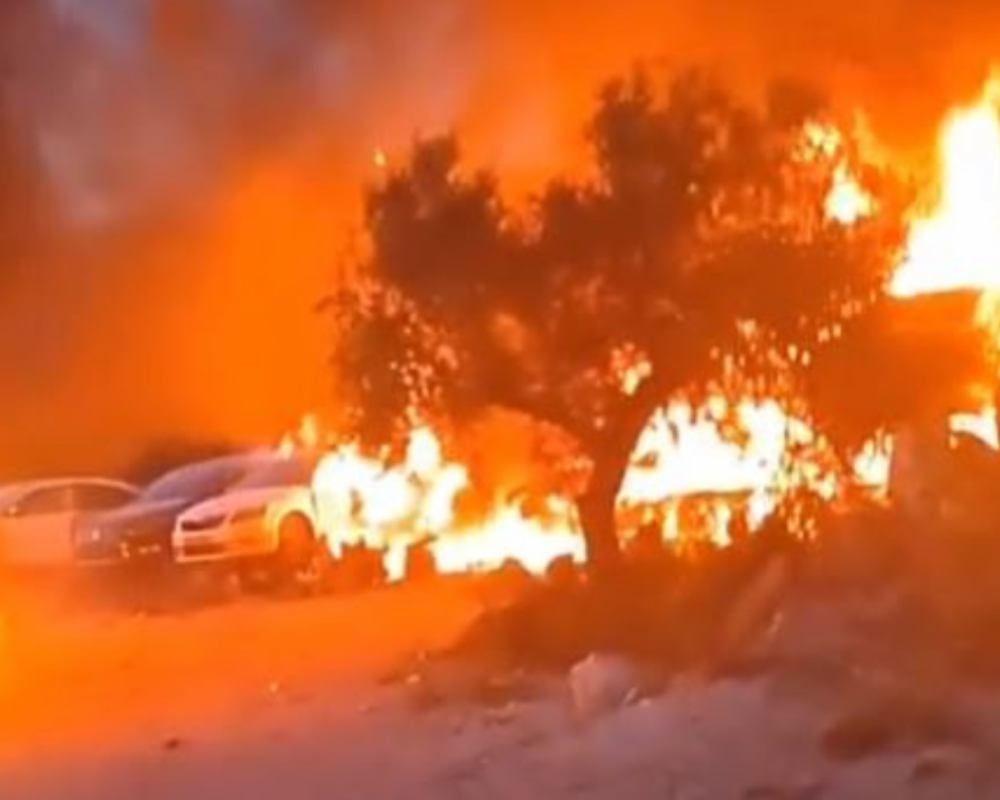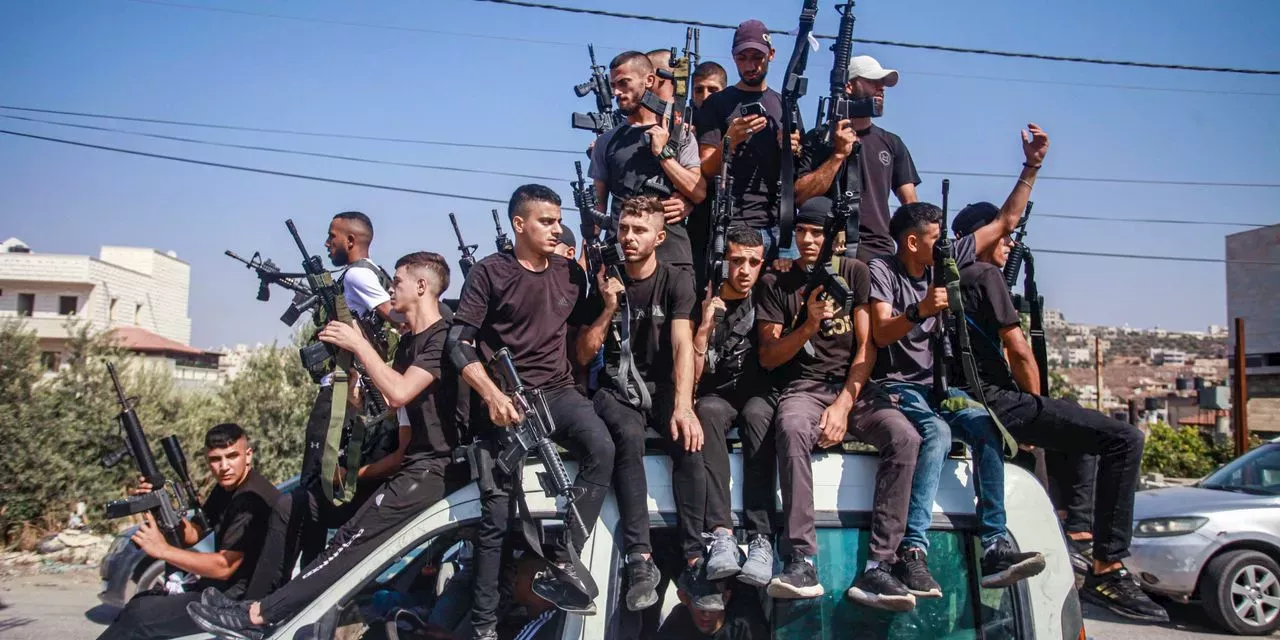






:quality(70)/cloudfront-eu-central-1.images.arcpublishing.com/thenational/B4P7EZU6WR5BK4UZ5MEPPJ6IQQ.jpg)


Residents in the West Bank are living in fear as violence escalates in the wake of the Israeli-Palestinian conflict. Since Hamas's surprise attack on Israel, the West Bank has witnessed a surge in violence from the Israeli military, security forces, and settlers [278f3d00]. The Palestinian health ministry reports that 54 people, including children, have been killed and over 1,100 injured in the West Bank [278f3d00]. Disturbing videos capturing fatal violence from Israeli settlers have further exacerbated tensions [278f3d00]. The West Bank, already burdened with crowded checkpoints, difficult transport, and limited freedom of movement, is now facing closed checkpoints, impacting workers' ability to reach their jobs and causing economic hardship [278f3d00]. The lack of political leadership and the aging leadership of the Palestinian Authority have also come under criticism [278f3d00]. As violence continues to escalate, some residents are resorting to violence themselves or seeking guns out of fear and desperation [278f3d00]. Panic-buying of medicines and shortages of essential goods have also been reported in the West Bank [278f3d00].
The situation in the West Bank is further compounded by the smuggling of weapons into the region, raising fears of a new war front. Armed Palestinians in the West Bank have celebrated a shooting attack that killed two Jewish settlers [bbd87e27]. Iran and its allies are reportedly involved in smuggling weapons into the West Bank, posing a threat not only to Israel but also to Jordan [bbd87e27]. This development has heightened concerns and increased tensions in the region.
Israeli settlers in the West Bank are seizing the opportunity to violently dispossess Palestinians of their land, contributing to the escalating violence. Eight Palestinians, including a child, have been killed by settlers, and 858 West Bank Palestinians have been forcibly transferred since the war began, with 13 communities entirely wiped out [f3d7c668]. Settler violence is not just the actions of a few individuals, but rather a systemic issue within Israel. Teenage boys who used to beat Palestinians are now turning up in military fatigues with guns. The settlers often collaborate with the military, providing their version of events and inviting soldiers for meals. The settlers aim to empty the land of Palestinians rather than physically take it. The violence is impacting the Palestinian economy, with Israeli-controlled borders closed and a loss of income from Arab-Israeli shoppers [f3d7c668]. The situation in the West Bank could become a new front in the ongoing war, but the outcome and potential resolution depend on the fate of Prime Minister Benjamin Netanyahu and his hardline allies [f3d7c668].
The escalating violence, fear, and weapons smuggling in the West Bank are exacerbating the already volatile Israeli-Palestinian conflict. The situation calls for urgent attention and diplomatic efforts to de-escalate tensions and restore peace in the region.
In addition to the escalating violence, an Israeli advocacy group called Peace Now has reported a surge in unauthorized settlement activity in the occupied West Bank [bd70f2d8]. The group has documented the establishment of nine new settlement outposts and the creation of dirt paths and roads not authorized by the Israeli government [bd70f2d8]. Settlers have also been fencing off open areas to block access to Palestinian herders [bd70f2d8]. These actions have fueled tensions in the area, which has already seen high levels of violence and military raids over the past year [bd70f2d8]. The surge in settlement activity is attributed to the permissive military and political environment during the war in Gaza [bd70f2d8].
The Israeli government, which has retroactively authorized settlements in the past, is currently led by a far-right coalition that supports settlement expansion [bd70f2d8]. However, most countries consider all settlement construction in the West Bank to be a violation of international law [bd70f2d8]. Palestinians view the land as part of a future independent state, further fueling tensions between the two sides [bd70f2d8].
The unauthorized settlement surge in the occupied West Bank adds another layer of complexity to the already volatile situation. It highlights the ongoing struggle for land and resources between Israeli settlers and Palestinians, further exacerbating the violence and tensions in the region. Urgent diplomatic efforts are needed to address the escalating violence, settlement expansion, and restore peace in the West Bank.
Palestinians in the Israeli-occupied West Bank claim that armed Jewish settlers are seizing their lands by establishing shepherding outposts and refusing to leave. The settlers imitate Palestinian farmers and employ violence, including throwing stones and blocking roads. The settlers have obstructed Palestinian access to their land, which rightfully belongs to them. Israel has occupied the West Bank since 1967, and around 490,000 Israeli settlers live there in communities considered illegal under international law. The hardline religious-nationalist settler movement has been blamed for an increase in attacks and land grabs since the start of the Gaza war. Settlers in shepherding outposts carry guns, use attack dogs, and have confiscated local houses, tractors, horses, and donkeys. Israeli rights group B'Tselem reported that attacks by settlers have surged, and settler groups have enjoyed backing from Israeli security forces. So far this year, Israel has seized over 1,000 hectares of West Bank land. Local residents have been impacted, with losses amounting to thousands of dollars. They are unable to access their olive groves during harvest season and are defenseless against the heavily armed settlers. [9e6ca92d]
A West Bank village called Duma has been targeted by Israeli settlers in an attack that left 15 homes damaged by arson and six residents injured by bullets. The attack, which caused an estimated five million shekels ($1.3 million) in damage, is one of nearly 800 settler attacks against Palestinians in the occupied West Bank since Hamas attacked Israel from the Gaza Strip on October 7 [1ab1fa23]. The village of Duma, with a population of over 2,000 people, lacks the power to defend itself and has limited resources to clean up and rebuild. Israeli human rights groups blame the far-right government of Prime Minister Benjamin Netanyahu for fueling settler violence by promoting an ideology of total Israeli supremacy in the West Bank. The United States has increased pressure on Israel to curb settler attacks in the West Bank, but the chief of Duma does not believe the pressure campaign will be effective. Duma is surrounded by outposts that have expanded gradually over the past decade, and settlers have cut off the village's access to vital springs and wells. The village is in a section of the West Bank known as Area B, where the Palestinian Authority governs civil affairs but the Israeli military is in charge of security [1ab1fa23].
Israeli colonist militias have continued their attacks on Palestinians in the West Bank, causing further damage and raising tensions in the region. In the village of Yatma, south of Nablus, Israeli colonists set fire to a scrapyard and large areas of farmland, and threw stones at a house [8f8b16ef]. Villagers confronted the attackers and managed to extinguish the fires. Confrontations between residents and the colonists escalated, leading Israeli soldiers to fire live ammunition and tear gas [8f8b16ef]. Fortunately, no injuries were reported. In a separate incident, colonists attacked a truck carrying agricultural aid near the town of Beita [8f8b16ef].
The ongoing attacks by Israeli settlers on Palestinians in the West Bank are a clear violation of international law and contribute to the escalating violence and tensions in the region. The Israeli government must take immediate action to curb settler violence and ensure the safety and security of Palestinian residents in the West Bank. Diplomatic efforts are also crucial to de-escalate tensions and restore peace in the region.
The United Nations High Commissioner for Human Rights, Volker Türk, has condemned the rising violence in the West Bank, stating that over 500 Palestinians have been killed since October 7, 2023 [b5b907d2]. Türk emphasizes the need for Israel to adopt and enforce rules of engagement that are fully in line with applicable human rights norms and standards. He also calls for thorough and independent investigations into any allegations of unlawful killings and for those responsible to be held accountable. Türk highlights the use of lethal force by the Israeli Security Forces (ISF) as a first resort against Palestinian protesters, often without representing an imminent threat to life. He notes a pattern of the denial or delaying of medical assistance to those injured, suggesting intent to kill in violation of the right to life. Türk condemns the pervasive impunity for such crimes and calls for international law to be respected and enforced [33e9aa3c].
As violence surges in the occupied West Bank, Palestinians and human rights groups decry an increasingly blurry distinction between the Israeli army and settlers, emboldened by the current pro-settlement government [56eced0e]. The Israeli army has been accused of 'active' support for settlers in the West Bank violence, raising concerns about the role of the military in the escalating conflict [56eced0e]. Palestinians and human rights groups argue that the Israeli army's actions, such as providing protection to settlers during attacks on Palestinians, demonstrate a clear bias and complicity in settler violence [56eced0e]. This blurred distinction between the Israeli army and settlers further exacerbates tensions and undermines efforts to de-escalate the violence in the West Bank [56eced0e]. Urgent action is needed to address this issue and ensure the protection of Palestinian civilians in the occupied territories.
The West Bank has been under Israeli occupation since 1967. Israeli government policies have resulted in a system where Palestinians are given lesser status compared to Jewish settlers, resulting in accusations of enforcing apartheid. Apartheid is a system of institutionalized racial segregation and discrimination. In the West Bank, Palestinians face land confiscation and settlement by Jewish settlers, unequal access to basic needs such as food and water, restricted freedom of movement, and an unequal legal system. Human rights organizations such as B'Tselem and Human Rights Watch have recognized and reported on the systematic discrimination and segregation faced by Palestinians. The struggle for equality and justice continues.
A surge in Jewish settler violence against Palestinians in the West Bank is raising the ire of some in the international community. The European Union has sanctioned five Israeli settlers, two outposts, and an extremist group for human rights abuses against Palestinians. The United States has also imposed sanctions on Israelis and entities in the West Bank. Peace Now, an Israeli organization, accuses the Israeli government of failing to enforce its own laws and being complicit in settler violence. The West Bank is home to about 2.7 million Palestinians and over 500,000 settlers. Palestinians argue that settlements are a creeping annexation that hinders the creation of a future independent Palestinian state. The Israeli military has shut down many roads in the West Bank, limiting Palestinian access to large areas and advancing settlers' aims. [7c5d0292]